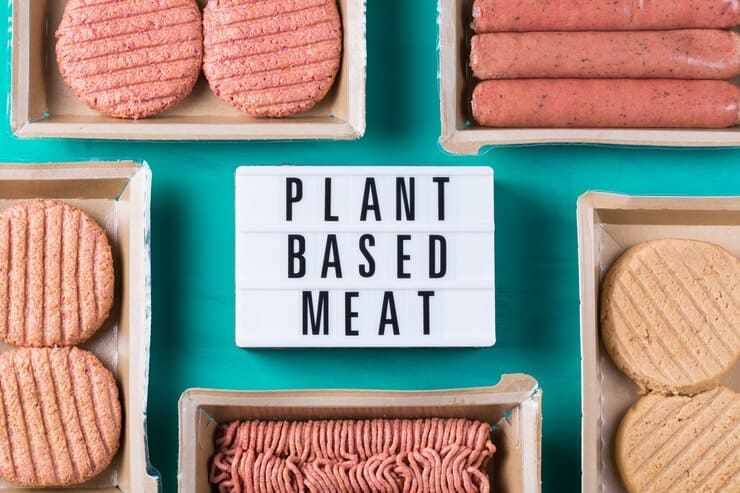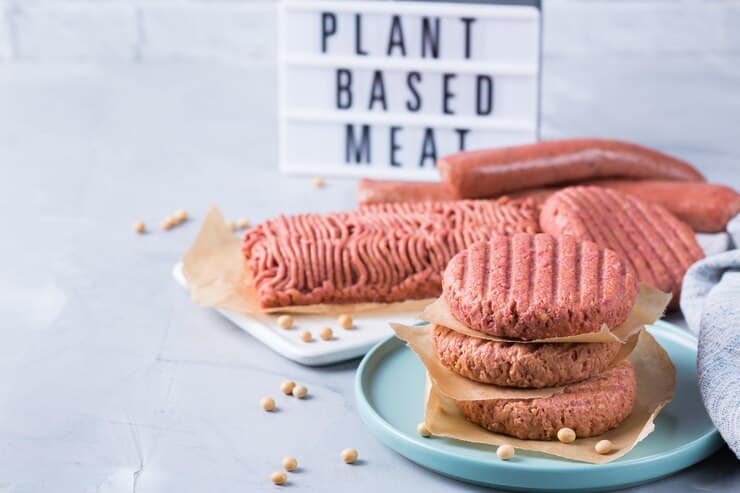Are you looking for healthy, whole food vegan meat options? This comprehensive guide explores the best plant-based meat alternatives, backed by research. Discover a wide range of delicious and nutritious options that will satisfy your cravings and support your health goals. From hearty legumes to versatile grains, we’ve got you covered.
Ready to elevate your plant-based diet? Dive into this article to uncover the healthiest plant-based meat options, the best vegetarian substitutes for meat, and the top-rated plant-based meat brands. Don’t miss out on this opportunity to fuel your body with wholesome, plant-powered goodness. Join the growing community of health-conscious individuals and explore the world of whole food vegan meat options today!
Whole Food Vegan Meat Options Trend
The trend of whole food plant-based meat options has deep historical roots, dating back to ancient China where Buddhist monks created vegetarian dishes resembling meat to adhere to the principle of ahimsa (non-violence).
Fast forward to the 21st century, companies like Beyond Meat and Impossible Foods have revolutionized the market with their innovative products. In 2024, several influencers, including Carleigh Bodrug and Torre Washington, have embraced and promoted these meat alternatives, showcasing their benefits on social media platforms.
The market for plant-based meats has seen remarkable growth, with the global market valued at $5.3 billion in 2021 and projected to reach $33.3 billion by 2031, growing at a CAGR of 20.5% from 2022 to 2031. This surge reflects a growing consumer consciousness about the environmental and health impacts of their dietary choices.

Reasons Behind the Shift
The shift away from highly processed plant-based meat alternatives is primarily driven by a growing consumer awareness of the potential drawbacks associated with excessive processing. Many consumers are becoming more discerning, seeking out options that align with their values of health, sustainability, and ethical consumption. As a result, there’s a growing preference for whole food plant-based proteins that are minimally processed and retain their natural nutrient profiles.
Additionally, concerns about the environmental impact of highly processed foods, including the energy-intensive production processes and potential for food waste, have further fueled this trend. By opting for whole food plant-based meats, consumers can make more informed choices that benefit both their health and the planet.
Innovative Whole Food Meat Alternatives
Whole food plant-based meat alternatives have a rich history that dates back to ancient China, where tofu was first created during the Han Dynasty (206 BC-220 AD). Over the centuries, various cultures have developed plant-based meat substitutes, such as tempeh in Indonesia and seitan in Japan. The modern era of plant-based meat began in 1877 with the invention of “Protose” by the Kellogg brothers, made from peanuts and wheat gluten.
Here are some of the most innovative whole food plant-based meat alternatives in 2024:
- Actual Veggies Green Burger: Made from 100% whole vegetables like kale, broccoli, and spinach, this gourmet burger has seen over 300% growth in the past year.
- Meati Carne Asada Steaks: Created from MushroomRoot, a specific type of mycelium, these whole-cut steaks are seasoned with cumin, paprika, and other spices.
- Abbot’s Butcher Plant-Based Chopped Chick’n: Using clean ingredients like yellow peas and porcini mushrooms, this chicken alternative is free from soy, gluten, and preservatives.
- Atlantic Sea Farms Basil Pesto Sea-Veggie Burger: Featuring regeneratively grown kelp as the star ingredient, this burger is a product of a women-led company producing non-GMO kelp in Maine.
- Three Trees Organic Original Unsweetened Almondmilk: Made with just almonds and water, this organic nut milk takes simplicity to the next level.
These products are leading the way in the plant-based meat market, offering delicious and sustainable alternatives to traditional meat. Have you tried any of these yet?
Cooking Techniques for Whole Food Plant-Based Meats
Cooking whole food plant-based meat alternatives can be both fun and nutritious!
Sautéing
One simple technique is sautéing. To do this, heat a non-stick pan over medium heat and add a small amount of vegetable broth or water. Then, add your desired plant-based meat alternative, such as tofu, tempeh, or seitan. Stir frequently to prevent sticking and ensure even cooking.
Aim for a medium heat of around 350°F or 175°C, and cook for typically 5-10 minutes, depending on the product.
Baking
Baking is another great way to cook plant-based meat alternatives. To get started, preheat your oven to the temperature specified in the recipe, usually around 350°F or 175°C. Next, place your chosen plant-based meat alternative on a baking sheet lined with parchment paper.
Bake until the alternative is golden brown and cooked through. The baking time can vary depending on the product, but generally, it takes 15-25 minutes. Remember to use unsweetened applesauce, mashed bananas, or pureed prunes as substitutes for oil in your baking recipes.
Stir-Frying
Stir-frying is a quick and flavorful way to cook plant-based meat alternatives. To stir-fry, heat a non-stick pan over medium-high heat, add a small amount of broth or water, and then add your chosen plant-based meat alternative. Stir frequently to cook evenly and prevent sticking. Aim for a temperature of around 400°F or 200°C and cook for 5-10 minutes.
Roasting
Roasting is a great way to add depth of flavor to plant-based meat alternatives. To roast, preheat your oven to 400°F or 200°C. Season your chosen plant-based meat alternative with your favorite spices, herbs, and a light water-soy sauce mixture.
Place the seasoned alternative on a baking sheet lined with parchment paper and roast until it’s browned and cooked through. Roasting typically takes 20-30 minutes.
Grilling
Grilling is a great way to add smoky flavor to your plant-based meat alternatives. To grill, preheat your grill to medium-high heat, which is around 400°F or 200°C. Create a marinade using vegetable broth, soy sauce, and your favorite spices.
Brush your chosen plant-based meat alternative with the marinade and grill for 5-10 minutes on each side, or until grill marks appear and the alternative is heated through. The total grilling time will depend on the thickness of the alternative, but generally, it will take 10-20 minutes.

Nutritional Comparison
Here’s a nutritional comparison between whole food plant-based meats and processed plant-based meats:
| Nutrient | Whole Food Plant-Based Meats | Processed Plant-Based Meats |
| Calories | Lower (approx. 150-200 kcal per serving) | Higher (approx. 250-300 kcal per serving) |
| Protein | Comparable (approx. 15-20g per serving) | Comparable (approx. 15-20g per serving) |
| Saturated Fat | Lower (approx. 1-2g per serving) | Higher (approx. 3-5g per serving) |
| Sodium | Lower (approx. 200-300mg per serving) | Higher (approx. 400-600mg per serving) |
| Fiber | Higher (approx. 5-7g per serving) | Lower (approx. 1-2g per serving) |
| Additives | Fewer (minimal processing) | More (often contains preservatives, flavor enhancers) |
Whole food plant-based meats are generally made from minimally processed ingredients like whole vegetables, legumes, and grains, resulting in lower calories, saturated fat, and sodium, and higher fiber content.
On the other hand, processed plant-based meats often contain more additives and preservatives to enhance flavor and extend shelf life, leading to higher calorie, saturated fat, and sodium content.
Environmental Impact
Recent studies in 2024 have highlighted the significant environmental benefits of whole food plant-based meats compared to conventional animal meats. According to a life cycle assessment (LCA) conducted by the Good Food Institute, plant-based meats have approximately 50% lower greenhouse gas emissions than animal-based meats.
Additionally, they require less land and water and produce fewer pollutants. The study also found that plant-based meats contribute to reducing habitat loss and antibiotic resistance, which are major concerns associated with industrial animal agriculture.
Another study from Harvard T.H. Chan School of Public Health emphasized that healthier plant-based diets, which include whole food plant-based meats, have a lower environmental impact than less healthy plant-based diets. This is because they require fewer resources like cropland and irrigation water.
The global shift towards these sustainable food options is expected to play a crucial role in mitigating climate change and promoting environmental sustainability
Comparison to both animal-based meats and processed alternatives
A 2024 study published in the Canadian Journal of Cardiology found that plant-based meat alternatives (PBMAs) tend to have a more heart-healthy nutritional profile compared to animal-based meats. PBMAs generally have lower cholesterol levels and can improve cardiovascular risk factors. However, some PBMAs have high sodium content, which could be a concern.
Production Methods
Traditional animal-based meat production involves raising animals, feeding them, and then slaughtering them for meat. This process is resource-intensive and has a significant environmental impact due to greenhouse gas emissions, water usage, and land requirements.
Plant-based meats are made from ingredients like soy, peas, and wheat gluten. The production process involves extracting proteins from these plants and forming them into meat-like products1. This method is generally more sustainable and has a lower environmental impact compared to traditional meat production.
Packaging
Packaging for animal-based meats often includes vacuum-sealed plastic packaging to maintain freshness and prevent contamination.
Plant-based meats are also typically packaged in plastic, but there is a growing trend towards using more sustainable packaging materials like biodegradable or recyclable packaging.
Brands and Companies
Animal-based meats are produced by major companies such as Tyson Foods, JBS, and Cargill. These companies dominate the traditional meat industry.
On the other hand, processed plant-based meats are gaining popularity. Leading brands in this category include Beyond Meat, Impossible Foods, and Quorn. These companies are known for creating innovative and realistic plant-based meat alternatives.
Health Concerns
Consumption of red and processed meats has been linked to increased risks of cardiovascular diseases, type 2 diabetes, and certain cancers. While generally healthier, some plant-based meats have high sodium levels, which can be a concern for individuals with hypertension.
Ethical Concerns
Ethical concerns include animal welfare issues, such as the conditions in which animals are raised and slaughtered. Ethical concerns are generally lower, but there are still issues related to the use of genetically modified organisms (GMOs) and the environmental impact of large-scale agriculture.
Challenges and Solutions of Whole Food Vegan Options
Ensuring that vegan meat products meet safety and quality standards can be challenging. There are concerns about on-pack claims and the need for clear labeling. Some consumers are skeptical about the taste and texture of vegan meats compared to traditional meat.
Ensuring that vegan meat alternatives are nutritionally balanced and provide essential nutrients is another challenge. While vegan meats are generally more sustainable than traditional meats, some plant-based alternatives can still have a significant environmental impact due to processing and packaging.
Companies like Beyond Meat and Impossible Foods are using cutting-edge technology to create plant-based meats that closely mimic the taste and texture of animal meat. Vegan influencers like Lauryn Evarts (The Skinny Confidential) and Jenna Barrington (Jenna Zoe) have been promoting vegan meat options, helping to increase consumer acceptance and awareness.
Nutritionists and dietitians are advocating for the inclusion of vegan meats in a balanced diet, highlighting their health benefits. Companies are focusing on reducing the environmental impact of their products by using sustainable packaging and sourcing ingredients responsibly.
Statements from Companies and Professionals
- Beyond Meat: “Our mission is to create the future of protein, making plant-based meats that are delicious, nutritious, and sustainable.”
- Impossible Foods: “We’re committed to making plant-based meat that’s better for the planet and better for people.”
- Jessica Sage (RSSL): “Vegan and vegetarian products require a carefully considered manufacturing strategy to ensure safety and quality.”
- Lauryn Evarts: “I love incorporating vegan meats into my diet because they’re not only good for the planet but also super tasty!”
These efforts and collaborations are helping to address the challenges and make vegan meat options more accessible and appealing to consumers.

Tips for Dining Out and Traveling as a Vegan
Dining out and traveling as a vegan has become much easier with the increasing availability of plant-based meat options at various restaurants across the US. Here are some tips and popular establishments to check out:
- Look up vegan-friendly restaurants and menus online before you go. Many restaurants now list their plant-based options on their websites or social media.
- Don’t hesitate to ask for modifications to dishes to make them vegan-friendly. Most chefs are happy to accommodate dietary preferences.
- Apps like HappyCow and Veggie Passport can help you find vegan and vegetarian restaurants near you.
- Bring along some vegan snacks for emergencies, especially when traveling to less vegan-friendly areas.
- Clearly communicate your dietary preferences to the server to avoid any misunderstandings.
Popular US Restaurants with Plant-Based Options
- Bareburger: Offers a variety of plant-based burgers, including the Impossible Burger and Beyond Burger, as well as vegetarian-friendly toppings.
- Burger King: The Impossible Whopper is a popular choice, and they are testing a plant-based version of their Chicken Royale sandwich.
- California Pizza Kitchen: Their California Veggie Pizza and Tostada Thin Crust can be made plant-based, along with a selection of soups, bowls, and salads.
- Cheesecake Factory: Offers several vegan options, including the vegan Cobb salad, Korean fried cauliflower, and their version of the Impossible Burger.
- Del Taco: Known for their Epic Beyond Fresh Guacamole Burrito, which is completely vegan and packed with protein.
- Dunkin’: While they discontinued the Beyond Sausage breakfast sandwich, they still offer options like bagels, hash browns, oatmeal, and a vegetarian Southwest Veggie Power Breakfast Sandwich.
These establishments are making it easier for vegans to enjoy dining out and traveling without compromising their dietary choices.
FAQs
What is a good vegan substitute for meat?
Tofu, tempeh, seitan, lentils, beans, and jackfruit are excellent vegan meat substitutes, offering protein and diverse textures.
What kind of meat can vegans eat?
Vegans do not consume any meat products, including poultry, seafood, and red meat.
Does a whole food plant-based diet include meat?
No, a whole food plant-based diet excludes all animal products, including meat.
What is whole food vegan?
A whole food vegan diet focuses on minimally processed plant-based foods like fruits, vegetables, whole grains, legumes, nuts, and seeds.
Final Thoughts
As you embark on your plant-based journey, remember that exploring a variety of whole food vegan meat options can be a delicious and rewarding experience. By incorporating these versatile and nutritious alternatives into your meals, you can enjoy the flavors and textures of traditional meat dishes without compromising your ethical or health goals.
From sautéing to roasting, grilling to baking, there are countless ways to prepare these plant-based proteins. Experiment with different cooking techniques and seasonings to discover your favorite flavors. Remember, the key to a successful plant-based diet is to have fun and enjoy the process of creating delicious and satisfying meals.




